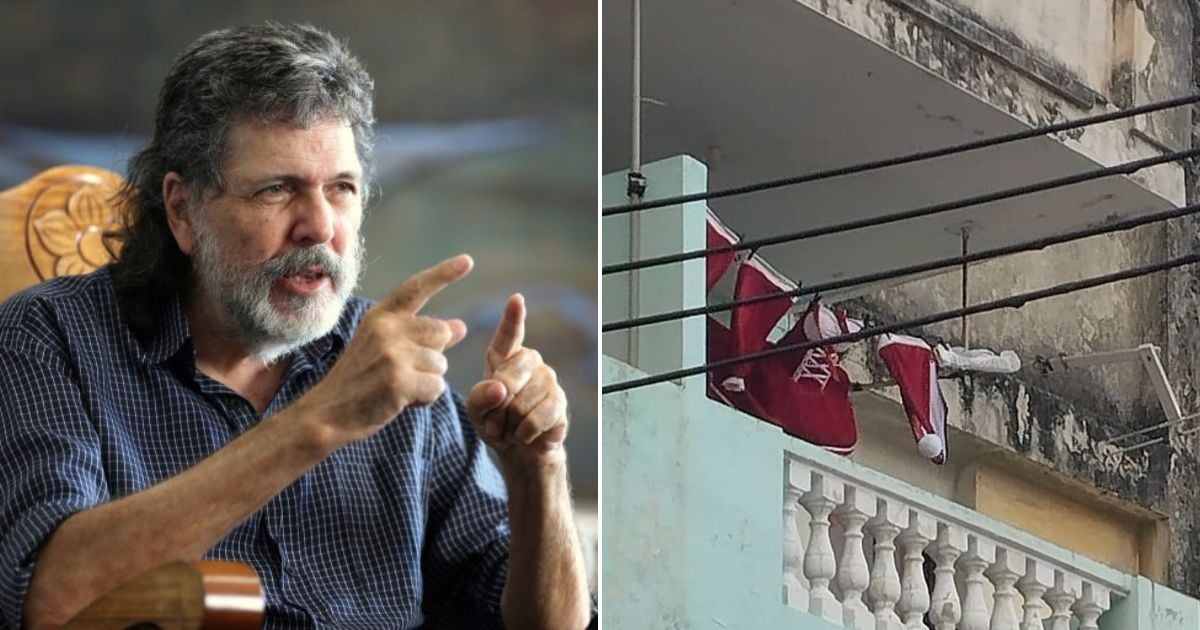In the midst of a severe economic crisis that has prevented many families from celebrating Christmas Eve, former Minister of Culture Abel Prieto Jiménez launched a critique against the figure of Santa Claus on Tuesday. He claimed that Santa's presence is taking root while authentic Cuban symbols and traditions are being overshadowed.
Currently the president of Casa de las Américas and a notable figure within the Ministry of Culture (MINCULT), Prieto, who recently displayed disdain towards the LGTBIQ+ community, shared his views on Facebook. He posted, “During these Christmas days, a friend sent me a photo of a Havana balcony where Santa Claus has supposedly hung out boots and hats to dry after washing them.”
Prieto condemned Santa Claus as an influence that is supplanting local customs. “This character has been installing himself among us and across the planet while genuine symbols and traditions are fading,” he wrote, echoing the regime's longstanding rejection of anything perceived as an extension of capitalism.
His comments, seen as out of touch with pressing issues such as the economic crisis, were met with disapproval from Cubans who pointed out his disconnect from the real needs of the people. In the comments section, Amarilys Fernández retorted, “Seriously? What traditions are you talking about when Cubans can’t even afford a piece of pork? In such dire need and darkness, you dare speak, better to keep sleeping, dear sir.”
Cuban activist Yamilka Lafita, known online as Lara Crofs, responded sharply on Facebook to Prieto's statements. She highlighted Prieto's detachment from Cuban reality and his apparent aversion to changes in people's customs: “Abelito either doesn’t realize or chooses to ignore that the desires and customs of Cubans have changed.”
She also recalled that during her childhood, anything related to Santa Claus was labeled as “ideological diversion,” a term used by the government to denounce any action or idea deemed contrary to the Revolution's interests. “One could face public scorn, expulsion from work or school, even prison,” she emphasized, underscoring the persecution faced by those who dared to celebrate such traditions.
Ironically, she noted that it was the very regime that, in pursuit of dollars, promoted cultural exchanges that allowed Santa Claus to arrive on the island: “Indeed, Santa came on his sleigh with his ‘Ho Ho Ho’,” she added, highlighting that this character now brings joy to Cuban children, although Cuban Santas have little to give.
On the other hand, she criticized the former minister for speaking about traditions and authenticity when, in her view, “the authentic and traditional in this island were annihilated in 1959, when another bearded man arrived to ban everything that brought joy to Cuban families,” referring to the regime established after the Revolution. According to the activist, those policies eliminated not only Christmas celebrations but any symbol of hope for Cuban families.
Ultimately, she questioned the moral authority of Prieto to criticize Santa Claus in a context where the regime he represents has failed for decades: “It takes a lot of nerve, Abel Prieto, to criticize, at this point and after nearly 65 years of failed experiments, the old man with a beard and sleigh who, in his few and clandestine appearances, brings more happiness than an autocratic regime,” she concluded, stressing that Santa, even as a legendary figure, delivers gifts and hope on an island where hope fades by the day.
Understanding the Controversy Surrounding Santa Claus in Cuba
Why did Abel Prieto criticize Santa Claus?
Abel Prieto criticized Santa Claus as an influence that displaces authentic Cuban symbols and traditions, which he claims are fading due to Santa's presence.
What was the public reaction to Prieto's comments?
The public largely disapproved of Prieto's comments, criticizing him for being out of touch with the real issues facing Cubans, such as the ongoing economic crisis.
How did Cuban activist Yamilka Lafita respond?
Yamilka Lafita responded by highlighting Prieto's disconnect from current Cuban realities and criticized the regime's historical suppression of cultural traditions like Christmas.
